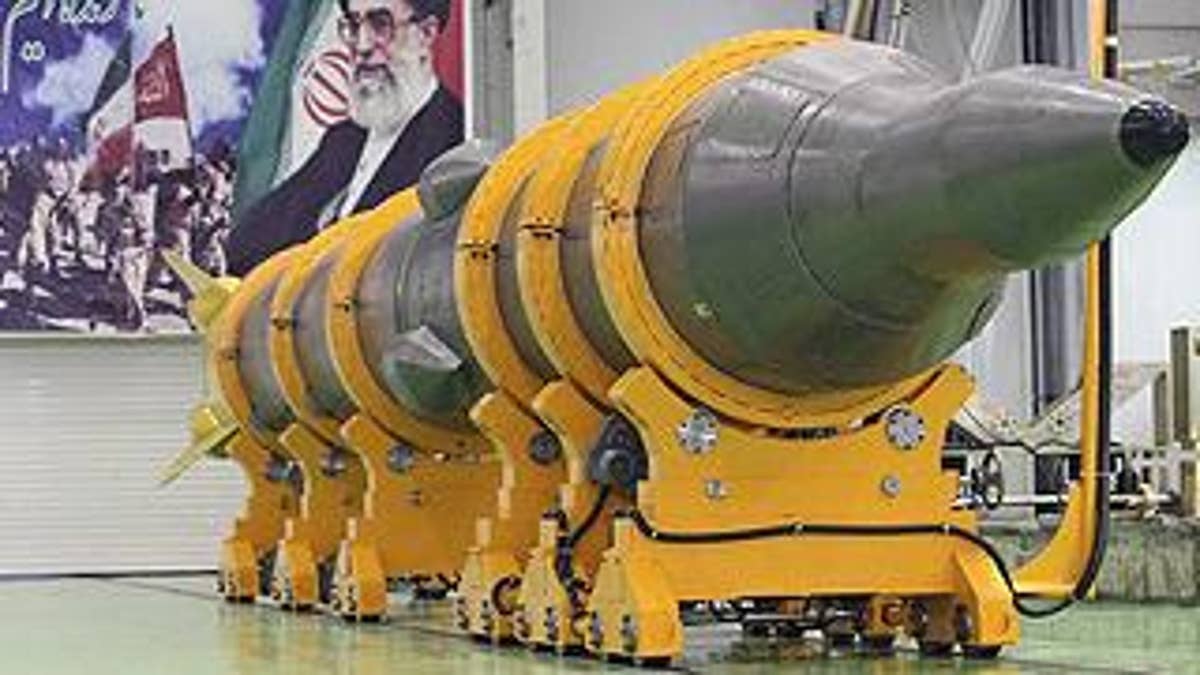
President Obama on Thursday defended a decision to shelve plans for a missile defense system in Eastern Europe, saying the new strategy was devised in response to new intelligence that shows Iran's missile threat is not aimed at the United States.
The missile defense system, planned under the Bush administration, was to have been built in the Czech Republic and Poland. The proposed system was pitched as a way to fend off potential attacks from Iran but it became a major irritant in relations with Russia, with whom the Obama administration is now negotiating a new Strategic Arms Reduction Treaty.
"We have updated our intelligence assessment of Iran's missile programs, which emphasizes the threat posed by Iran's short and medium-range missiles, which are capable of reaching Europe," Obama said in a brief announcement from the White House.
"This new ballistic missile defense program will best address the threat posed by Iran's ongoing ballistic missile defense program," he added.
Obama phoned Czech Prime Minister Jan Fischer Wednesday night and Polish Prime Minister Donald Tusk Thursday morning to alert them of his decision. The president added that the decision proves that its prior affirmations to Russia "that its concerns about our previous missile defense programs were entirely unfounded."
Obama and Defense Secretary Robert Gates said the decision was also made to accommodate the technology that is currently in existence.
"Our new missile defense architecture in Europe will provide stronger, smarter and swifter defenses of American forces and America's allies," Obama said. "It is more comprehensive than the previous program.
"Because our approach will be phased and adaptive, we will retain the flexibility to adjust and enhance our defenses as the threat and technology continue to evolve," he added.
Gates said the new system will allow for a "distributed sensor network" as opposed to a "single fixed site."
Speaking from the Pentagon, he said the interceptors can be deployed in northern and southern Europe as well as on ships. He said a second phase to begin in 2015 could result in missiles being placed on land in Eastern Europe.
But critics blasted the administration for the move.
U.S. Senate Minority Whip Jon Kyl released a statement Thursday morning accusing the administration of caving to Russia.
"The decision announced today by the administration is dangerous and short-sighted," the Arizona Republican said. "Not only does this decision leave America vulnerable to the growing Iranian long-range missile threat, it also turns back the clock to the days of the Cold War, when Eastern Europe was considered the domain of Russia. This will be a bitter disappointment, indeed, even a warning to the people of Eastern Europe."
Obama faced the dilemma of either hitting an obstacle in his effort to improve relations with Russia or disappointing two key NATO allies, the Czech Republic and Poland, that agreed to host components of the planned system.
Jan Fischer, the prime minister of the Czech Republic, one of two countries where the system was to be built, told reporters that the United States was basically dropping the plan. He said that Obama phoned him overnight to say "his government is pulling out of plans to build a missile defense radar on Czech territory."
Jiri Pere, a long-time aide to former Czech Republic President Vaclav Havel, told FOX News that Havel and other Czech politicians are "let down" by the apparent decision to scrap the shield program. The general public may be less disappointed, as polls show as much as 80 percent of the Czech population opposes a U.S. shield system in their country.
Pere said that while the stated objective of the shield was to protect the West from the Iranian threat, the "unspoken message" was to fend off Russian aggression.
Pentagon spokesman Geoff Morrell denied the charges that Russia was a factor in scrapping the plan.
"This improvement to the system has nothing to do with Russia and everything to do with Iran," he said.
"Those who say we are scrapping missile defense in Europe are either misinformed or misrepresenting the reality of what we are doing," Gates said.
NATO Secretary-General Anders Fogh Rasmussen called the U.S. decision "a positive step."
Konstantin Kosachev, head of the foreign affairs committee in the lower house of the Russian Parliament, said, "It reflects understanding that any security measure can't be built entirely on the basis of one nation."
Czech government spokesman Roman Prorok said Ellen Tauscher, a U.S. undersecretary of state for arms control and international security, was briefing Czech officials in Prague and Polish officials in Warsaw on Thursday about Obama's decision.
"This would confirm that Central Europe is not in the center of the Obama administration's interest," said Jaroslaw Gowin, lawmaker for Poland's ruling Civic Platform party. "But maybe the U.S. will offer us an alternative."
Obama took office undecided about whether to continue to press for the European system and said he would study it. His administration never sounded enthusiastic about the plan, and European allies have been preparing for an announcement that the White House would not complete the shield as designed.
The decision comes as the Obama administration has been seeking closer ties with Moscow and as Russian President Dmitry Medvedev prepares to visit the United States next week for the U.N. General Assembly and the Group of 20 nations economic summit.
The plan for a European shield was developed during the Bush administration, which reached deals to install 10 interceptors in Poland and a radar system in the Czech Republic. Moscow has argued that the system would undermine the nuclear deterrent of its vast arsenal.
FOX News' Jennifer Griffin and Greg Palkot and The Associated Press contributed to this report.





















